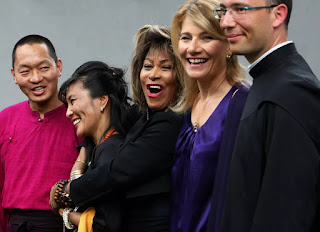JONAH VALDEZ
Los Angeles Times
May 24, 2023
While Tina Turner is heralded as an R&B and rock icon, her Buddhist faith was the soul that drove her eventful life and career.
She often credited the religion with helping her find the strength to leave her abusive relationship with Ike Turner in 1976. In the years since, Turner was known to recite Buddhist chants daily, even chanting on national television on Larry King’s CNN show in 1997, a practice she continued until her death on Wednesday, at 83, in her home in Küsnacht, near Zurich, Switzerland, where she had kept her own Buddhist shrine.
As tributes for the “Proud Mary” performer poured in online, many recalled the influence Turner’s faith had on their lives, inspiring them to start practicing Buddhism and some to also leave harmful relationships.
“Tina Turner is the reason I found Buddhism,” tweeted Jessica N. Pabón, a professor of women’s, gender and sexuality studies at SUNY New Paltz in New York. .
“She was my strength when I left my abuser,” former journalist Laura Keeney wrote while tweeting a Turner obituary, “and she introduced me to Buddhism as a balm for my soul.”
Laura A. Cole tweeted that Turner’s song “What’s Love Got to Do With It” taught her “that I could change my mind and my path on a dime if the life I was living no longer served me or even actively harmed me.”
Cole continued: “SHE introduced me to Buddhism and the peace of meditation.”
Turner was introduced to Buddhism by multiple people throughout the early 1970s. But it was a woman whom Ike Turner had brought to the studio one day who convinced the singer to start practicing. The woman, Valerie Bishop, was a member of the Soka Gakkai community, a form of Nichiren Buddhism, which is active throughout West Los Angeles, near where the Turners lived and recorded music. That was according to Taro Gold, co-author of Turner’s 2020 spiritual memoir, “Happiness Becomes You,” who was interviewed in 2021 by the Ho Center for Buddhist Studies at Stanford University.
The Grammy-winning singer, who grew up Baptist, eventually transitioned from reciting “The Lord’s Prayer” to chanting the basic prayer within Nichiren Buddhism, “nam-myoho-renge-kyo,” which translates to devotion to the mystic law of cause and effect. Members of Soka Gakkai customarily chant the prayer twice a day, morning and evening, in part to manifest things in their lives, such as happiness or other goals.
“The more you chant, the more you become liberated, mentally,” Turner said in the 2021 HBO documentary “Tina,” during a scene that featured a voice-over of her reciting Buddhist prayers.
“I started seeing my life — I started really seeing that I had to make a change,” Turner continued in the film, recalling the effect chanting had on her life. “I started to become much more confident. I mean, not even caring what Ike thought about me — becoming less afraid of him.”
Her introduction to Buddhism also came shortly after she attempted suicide by overdosing on Valium, Turner told USA Today in 2020. “Buddhism literally saved my life,” she said.
“When she found her spirituality, when she found Buddhism, that unlocked something inside of her,” “Tina” co-director T.J. Martin said in a 2021 interview with “PBS NewsHour.” “I think that gave her a sense of confidence that she was always searching for.”
While she struggled to regain momentum in her career after leaving Ike Turner, often working in Las Vegas showrooms and on the cabaret circuit, Turner’s constant performing and her faith had “kept her sane,” according to Martin.
And after laboring for nearly a decade, Turner rebounded to what would become a remarkable second act that began in 1984. Her solo album “Private Dancer” spawned the hits “What’s Love Got to Do With It” and “Better Be Good to Me.” She continued to perform and record until 1999, when she released “Twenty Four Seven,” her 10th and final solo album.
Throughout the last decade of her life, Turner was involved in various interfaith projects, such as the recording of a series of spiritual music albums with the Beyond Music project that combines Christian and Buddhist chants.
“When I recorded it, the sound I got back, I was very proud of it,” Turner said during an interview around the release of one of the group’s albums in 2011. “I hope the whole world will hear a prayer that brought me this far, and brought me to being a very happy person.”
https://www.latimes.com/entertainment-arts/music/story/2023-05-24/tina-turner-buddhism-ike-turner-nichiren


No comments:
Post a Comment